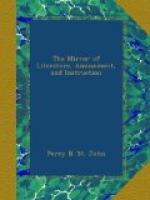Life, like a mighty river, bears us on
A rapid tide, we ne’er can rest
upon,
Adown the narrow stream, at first, we
glide
Thro’ fruits and flowers that fringe
the grassy side.
The playful murmurings of its windings
seem
Soft, as the far-off music of a dream,
Over our heads the trees their blossoms
shed,
Flowers on the brink their mingled odours
shed.
Beauty around, above us, Hope within;
Eager we grasp each dazzling charm to
win.
But hurried on and on, we ne’er
can stay
Our little bark to anchor or delay.
For now, how full, how deep, how vast
the river
On which we glide, that stays its journey
never!
As rolling years bring with them joy and
woe,
Dark, and more various, seems our voyage
to grow.
Buoyant we ride on waves of hope and joy,
Down, down, we sink, when earthly cares
annoy!
Futile and vain, alike each hope or fear
On, on, we glide, there is no resting
here.
For far behind is left each joy and woe,
The mighty river ne’er will cease
to flow!
And, rough and smooth, it hastens to its
home,
Glides by each futile hope and pleasure
gone.
Until within our ears the ocean roars,
And the bleak billows break upon the shores;
Beneath our keel the bounding waves arise,
And the land lessens from our aching eyes.
The floods of “Time’s wide
ocean” round us swell,
Earth take of us thy long and last farewell!
For witness of our future voyage
there’s none
But He, the Infinite, Eternal One!
Kirton Lindsey. ANNIE R.
* * * * *
ON VEILS.
(To the Editor of the Mirror.)
In No. 385, of the MIRROR, one of your Correspondents gives an account of the “Origin of wearing the veil,” in which he attributes it to Penelope, the beautiful wife of Ulysses. Now, for my own part, I feel inclined to query this statement of C.K.W. first by his own account of the origin, and second by Scripture.
Your Correspondent, speaking of the decision which the wife of Ulysses was to give, says, “the beautiful Penelope finding herself in this dilemma, blushed, and without making the least reply, drew her veil over her face,” &c. By this I think it is clearly understood that veils were common in Greece when this occurrence took place; or why say “her veil,” which readily implies, that it was customary to wear them, and also that it was near her at the time; although, perhaps, she might have been the first to use it upon such an occasion, namely, to hide her blushes from the observation of her father when she decided upon accompanying her husband in preference to staying with her parent. 2nd. In Scripture we find the veil used in Moses’ time, and even by Moses himself,[3] 1491 years before Christ; but the earliest mention




